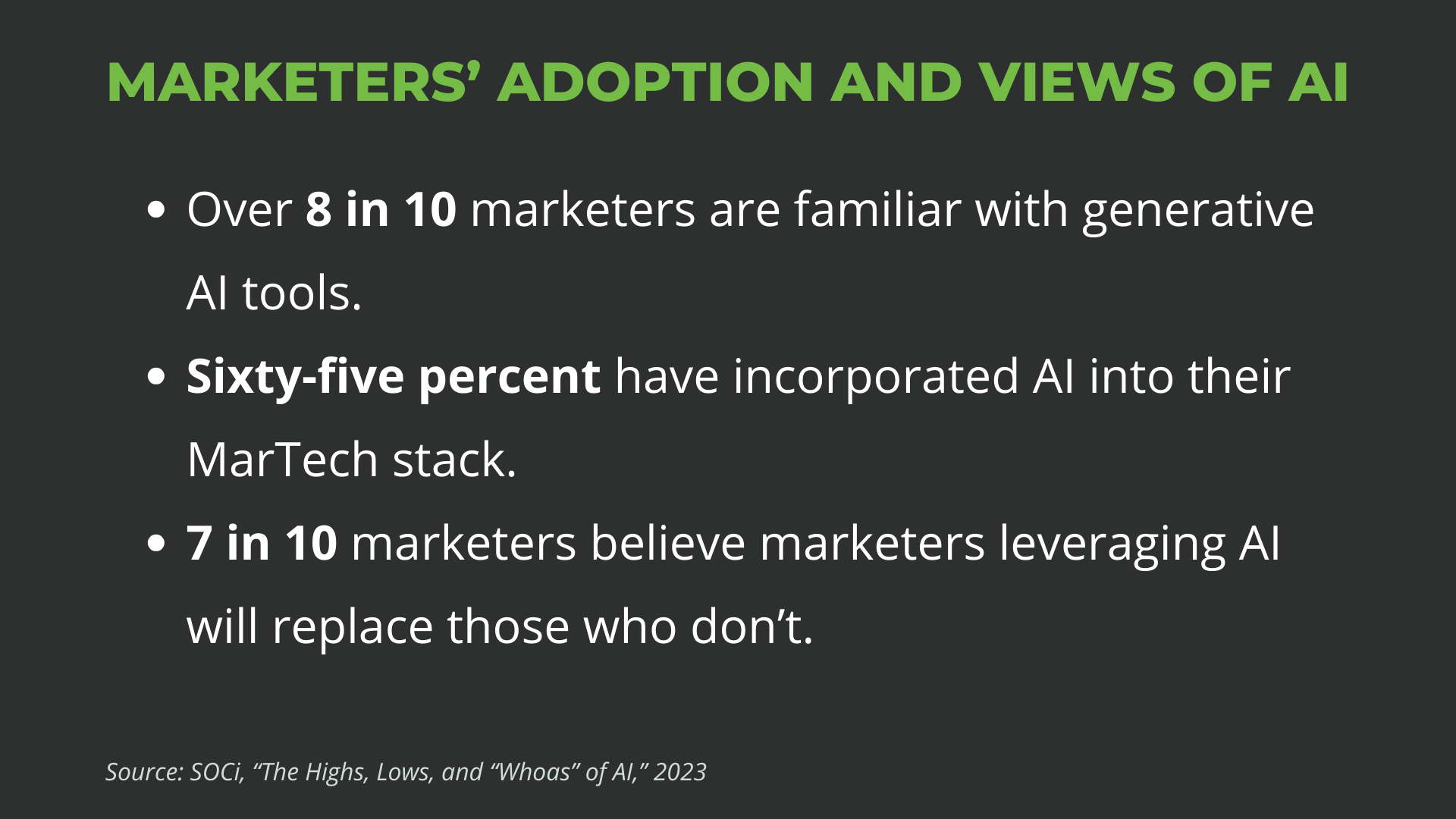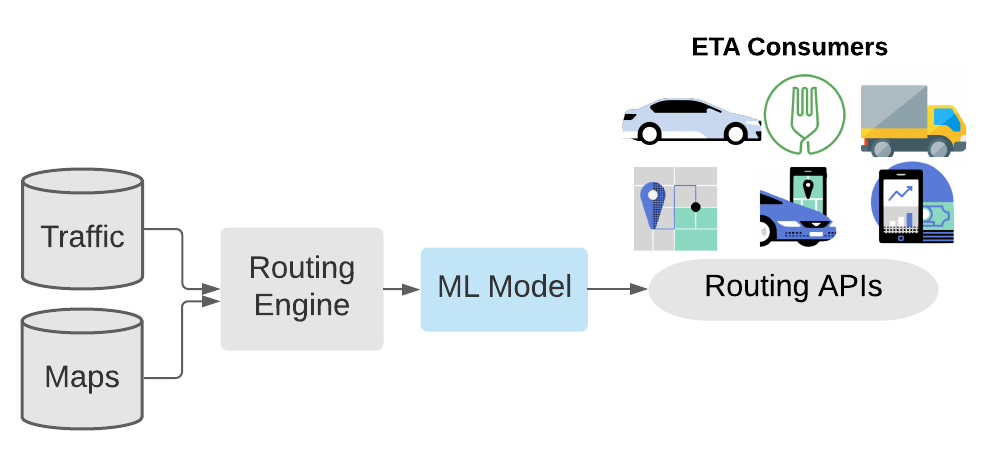AI Marketing — Your Complete Guide
Artificial intelligence (AI) is revolutionizing how companies market themselves and sell to consumers. Today, understanding AI’s influential role in marketing is a necessity. For sharp CMOs and marketing teams, an AI marketing strategy offers enhanced efficiency and a wealth of insights into customer behaviors, preferences, and demands.
Our recent survey of over 300 marketers revealed that many already use AI. Marketers who aren’t using AI or don’t plan to risk falling behind. The survey also found:
It’s clear that AI in marketing is no longer a nice to have; it’s becoming an integral part of your marketing toolbox.
Here, we’ll take a deep dive into what AI marketing entails, its benefits and challenges, and companies already excelling in their marketing strategies with AI.
What is AI in Marketing?
Table of Contents
AI in marketing entails leveraging artificial intelligence for strategic and often real-time analysis, automation, and information delivery. AI marketing helps you deliver more accurate and faster results.
Implementing AI into your marketing efforts can help redefine the customer experience (CX) through predictive analytics, personalized campaigns, and automated tasks.
AI marketing tools learn from data inputs to make increasingly smarter decisions. They’re the futuristic co-worker who stays back after office hours, analyze troves of consumer data, and guides you on your next best moves.
AI Applications in Marketing
The applications of AI in marketing are as diverse as they are powerful. Here’s how AI is transforming key facets of today’s marketing landscape.
1. Content Creation and Curation
Generative AI tools can craft content that is well-written and concise — and at a much faster rate. Below are three ways generative AI can help you create content.
Write Content
You can deploy generative AI to help brainstorm and write blog posts, ebooks, social media posts, and a plethora of other marketing material.
Edit Content
You can also use AI to edit content, ensuring it’s on brand, upholds your voice and tone guidelines, and maintains grammatical accuracy.
Repurpose Content
AI also allows you to transform existing content into fresh, engaging formats tailored for different channels and audiences. For example, you can turn a detailed long-form guide into a recap blog post or an infographic into several educational social media posts.
Additionally, AI can adapt content across various industries, such as seamlessly transforming a blog post intended for banks into a version suitable for mortgage companies.
Note that anytime you use AI to create content, you should always have a human review and fact-check the work. AI is your partner, but still requires human oversight.
2. Personalization
Today’s consumers expect a high level of personalization. Therefore, marketers must craft hyper-targeted campaigns to break out of the crowded space. Consumers’ interests, location, preferences, and purchase history should drive your marketing messages and campaigns.
For instance, a multi-location retail company can use AI to analyze stores’ sales history, weather, and reviews to draft tailored email campaigns. In early October, customers in Denver will receive personalized emails featuring the latest warm outerwear and rugged footwear, while those in Raleigh will see promotions for fall flannels and sweaters.
3. Predictive Analytics
With so much data available, marketers sometimes have difficulty deriving the best insights. To help marketers, AI can analyze large swaths of data and use predictive models and machine learning techniques to predict what consumers want or will do next.
Sticking with the retail company example, a retail brand can analyze historical shopping behaviors, purchase histories, and the previous year’s inventory to predict future sales and adjust its inventory accordingly.
4. Customer Service Chatbots
In recent years, AI advancements have significantly enhanced chatbots, enabling them to understand and process natural language with unprecedented sophistication. These advancements vastly improve user interactions.
AI-driven chatbots:
- Offer 24/7 support
- Address customer inquiries and resolve issues
- Maintain an on-brand voice and tone
- Reduce wait times
- Help boost customer satisfaction and brand loyalty
Furthermore, as AI chatbots engage in more interactions, they continuously refine and improve their performance. This leads to more accurate and helpful responses and enhances user satisfaction and effectiveness.
5. SEO
By integrating AI into SEO efforts, marketers can analyze vast datasets, helping them understand complex search patterns and user behaviors.
This level of analysis goes beyond traditional keyword research. It enables SEOs and content marketers to create more relevant and engaging content and optimize their sites. These content and site optimizations often improve the user experience, reduce bounce rates, and increase clicks — all of which influence SEO performance.
AI can also help your local SEO strategy by ensuring your local listings and pages are optimized for local search queries and include all the necessary information consumers and search engines seek.
Download our local SEO guide for more tactics and strategies.
AI Marketing Examples
Now, it’s time to explore some real-world applications of AI in digital marketing. We uncover innovative methods that are setting new benchmarks for success.
Netflix
If you’ve logged into Netflix before, you’ve seen artwork tiles for each film or series. In the past, Netflix tried to find the perfect artwork tile for all members.
Now, with the help of AI, Netflix relies on users’ viewing history, preferred genres, and cast preferences to personalize the artwork for each movie or series.
Here’s an example of Pulp Fiction artwork from Netflix, which is uniquely tailored for subscribers who frequently view movies starring Uma Thurman or John Travolta.
Courtesy of Netflix
Netflix’s various artwork for movie titles showcases AI’s ability to personalize the user experience and use predictive analytics to increase usage and subscriptions.
Uber
Uber, one of the main ridesharing and food delivery companies, uses AI and its machine learning (ML) platform, Michelangelo, for operations and research.
For instance, Uber’s estimated arrival time (ETA) needed improvement. Traditional routing algorithms calculate ETA by analyzing the shortest route from point A to point B. Uber uses this traditional calculation plus Michelangelo to get more accurate results. Michaelangelo considers historical and real-time data and other ML models to predict ETA better.
Courtesy of Uber
Uber’s use of AI and ML demonstrates how to improve efficiencies within their platform and produce more accurate results for their users, ultimately helping to improve customer satisfaction and retention.
AI Marketing Benefits
We’ve defined AI marketing and listed some of the best applications and examples for AI in marketing. If you’re still unconvinced, below are a few key benefits of incorporating AI into your marketing efforts.
1. Increased Efficiency
AI can automate repetitive tasks and streamline workflows, giving your marketers more time to focus on strategic initiatives and creative campaigns.
2. Enhanced Customer Engagements
AI chatbots don’t take coffee breaks; they’re available 24/7 to engage with customers. Beyond chatbot support, AI can help generate more personalized recommendations and marketing assets.
You can personalize blogs, emails, and social posts to one vertical, target audience, or local area, improving customer loyalty and engagement.
3. Improved ROI
Scaling your marketing efforts poses significant challenges, typically requiring more personnel, extended project hours, and an increased budget. However, AI can help. With data-driven decisions and campaign optimization, AI allows for real-time campaign improvements, saving your team time and money.
4. Competitive Advantage
Remember, 69% of marketers believe marketers leveraging AI will replace those that don’t.
Organizations and marketing departments that embrace AI gain a competitive edge. With AI, you’re staying ahead of the curve and delivering innovative solutions faster and more precisely than ever before.
AI Marketing Challenges and Considerations
While the benefits of AI are plentiful, AI isn’t all smooth sailing. It does present unique challenges your marketing teams must be aware of and prepared to address.
1. Inaccuracies and Hallucinations
Despite AI’s brilliance, it is fallible. Sometimes, generative AI can present ‘hallucinations’ or inaccurate results. This can lead to misinterpretations and flawed decision-making.
Establish a robust validation process that includes human oversight to mitigate these hallucinations. Always fact-check content and have regular audits of AI-derived insights by experienced data analysts.
It’s important to catch and correct any anomalies before they influence decision-making processes.
2. Bias Responses and Ethical Concerns
AI learns what it’s taught. Sometimes, it learns biases. Unfortunately, unconscious biases embedded in AI models can perpetuate stereotypes and discrimination, posing ethical dilemmas. These biases underscore the importance of diverse training data representing the business and marketplace.
3. Data Privacy and Security
Speaking of data, you need guardrails around collecting and processing consumer data. Therefore, you must prioritize consumer data protection and privacy compliance.
Educate your team on AI and data privacy laws, such as the EU’s General Data Protection Regulation (GDPR) and the California Consumer Privacy Act (CCPA).
You can also read our article on navigating privacy and AI for more tactics.
4. Skill Gap and Deployment
Bridging the skill gaps and fostering a culture of innovation is essential for successful AI implementation. Each AI technology still takes time and effort to learn and master.
You can bridge this skill gap by actively investing in specialized training and certifications for team members who will be using AI.
Download our workbook, A CMO’s Planning Guide to Navigating AI Transformation in 2024, to set the foundation for your AI marketing journey!
Why Marketers Are Turning to CoMarketing Clouds
An intriguing new development in marketing is the rise of comarketing — a combination of AI and human marketers working in tandem. With this partnership comes CoMarketing Clouds. These platforms offer an ecosystem where AI and human expertise unite to form the ultimate marketing machine.
CoMarketing Clouds avoid the all-AI or all-human marketing dichotomy in favor of a mixture that recognizes the strengths of each. The mix of human expertise and AI in CoMarketing Clouds offers businesses a comprehensive toolkit to enhance customer engagement, optimize marketing campaigns, and drive more sales.
If you’re a multi-location business, managing local engagements across multiple social platforms, listing directories, and local pages is particularly challenging. That’s why we’ve built the CoMarketing Cloud for multi-location enterprises.
SOCi Genius — an AI automation layer that our products use to automate human action — powers our CoMarketing Cloud. It’s your marketer and data analyst in one that leverages real-time data to provide actionable insights and recommendations for each location.
Request a demo today to discover the full potential of our CoMarketing Cloud and how it can transform your multi-location marketing approach.





